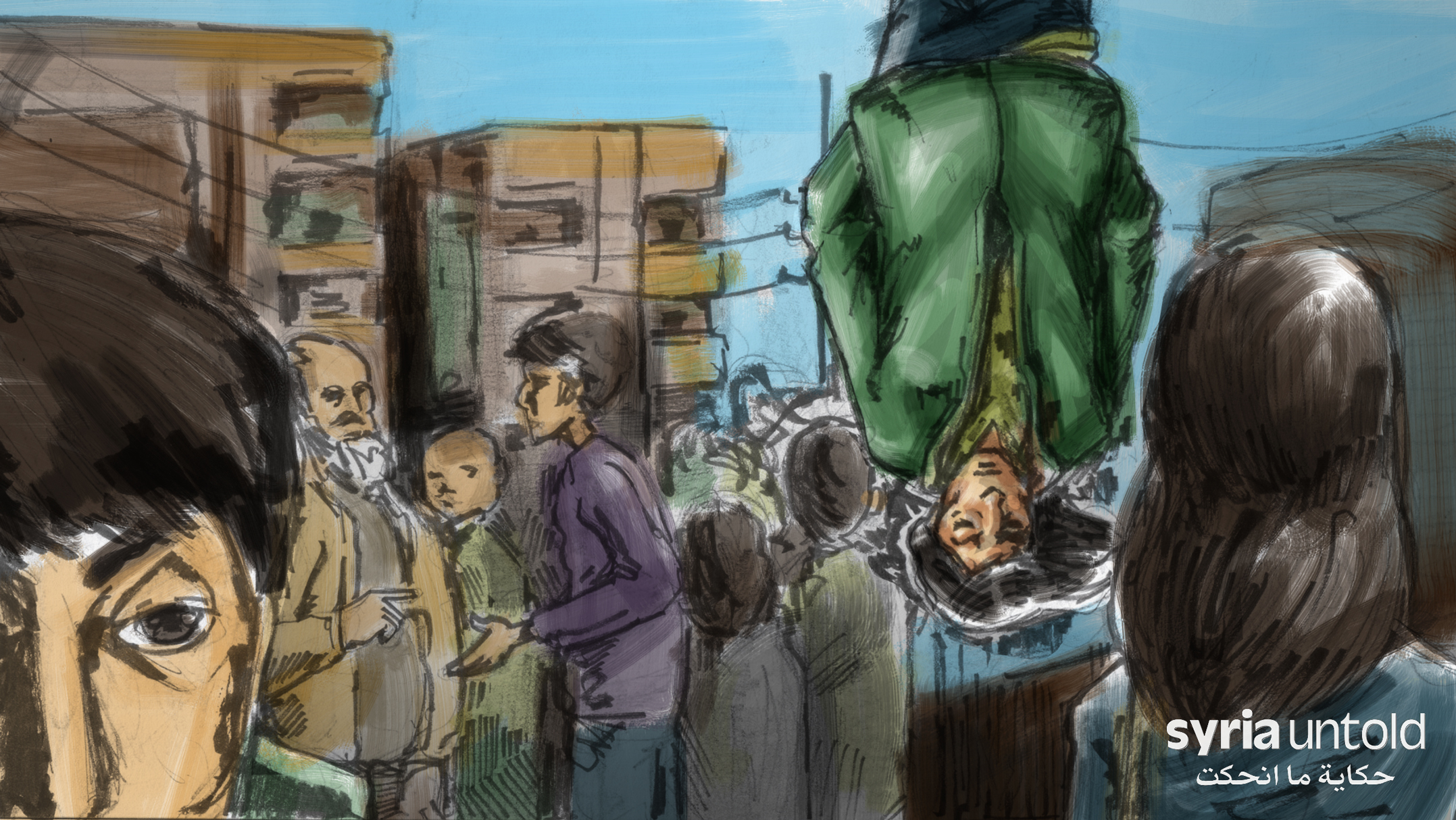At the clinic of a renowned psychiatrist in Damascus, waiting rooms are so jammed that one can barely find an empty seat or get an appointment in less than a week’s time. Some patients are more open to talk about their problems, while others avoid eye contact.
A young man wearing a military uniform barges into the waiting room and begs the secretary to let him see the doctor before returning to duty within hours. The secretary tells him to return the next day and promises to allow him in before other patients.
He told her, “I should return to duty today. How can I come back tomorrow? I can’t wait. I need to see the doctor, I beg you. I am a soldier, as you can see.”
“You are welcome, whoever you are but, believe me, we are overbooked today,” replied the secretary.
In an edgy state, the young man leaves the clinic and lights a cigarette with two shaking hands. Silence fills the room.
In the past few years, the relationship between Syrians and psychiatrists changed significantly. In the past, it was difficult to talk about mental illnesses in a society that had little awareness in that regard, and that classified all mental illness as madness, disability or demonic possession.
Expected benefits from visiting a therapist or taking prescribed medication were undermined and doubted. Mental illnesses with varying levels of severity increased to the extent that it was no longer possible to ignore the urgent need for the patient and the service provider— be that a doctor, specialist, social worker or volunteer in a psychological support program, to address this problem. Psychological support programs recently became more widely available as part of the humanitarian response system.
In 2018, a source in the Syrian Ministry of Health stated that 5% of Syrians, equivalent to around one million, suffer from severe mental illnesses. However, there are only 100 psychiatrists in Syria, and half of them live in Damascus. After Syrians had avoided visiting the psychiatrist in the past out of fear of being seen, waiting rooms are now overcrowded with returning patients who no longer care about privacy and secrecy as much as they care about getting treatment. They want their suffering to be alleviated and their concerns to be dispelled.

Solaf: Depression follows you for the rest of your life
Solaf remembers the first time she entered the psychiatrist’s clinic in one of Al-Jisr al-Abyad quarters. She was still in her 20s and had just graduated from the Faculty of Engineering. She was planning on committing to a young doctor who was preparing to leave for the US, just like many other medical school graduates at the beginning of the second millennium. After he crossed to the other side of the world and sent several conflicting and worrying messages, he told her he did not want to marry her.
Solaf had amazing green eyes, but she was overweight and had acne, which left scars on her face that proved resistant even to exfoliating sessions and treatment. Although she comes from a rich and important family, she was not that lucky with love. During her university years, her commitment to that doctor was the center of her life, and it controlled all she did and said. When he left her alone to build his future far from her, she had a severe psychological episode that almost killed her. Following a series of nervous breakdowns, suicide attempts and fasting episodes, she agreed to undergo behavioral and medical therapy.
Medication helped me break free from pain, but it did not make me happier. Behavioral therapy was a better answer
She remembered how hard it was to get medication, as it was expensive and not available in all pharmacies. She needed to give the pharmacist a doctor-sealed prescription that he would keep in his records and show, in case of legal control. She recalls how disappointed she was after taking the first pill. She was hoping all her sadness and dark thoughts would vanish within minutes. But she later discovered that anti-depressants take days and weeks to regulate the mood and restore psychological balance. When she first started taking medication, Solaf suffered from mouth dryness, lack of concentration and attention, forgetfulness and sluggishness. She also put on some weight. But, two weeks later, her mood started to change gradually as she described it.
“I wouldn’t call it an improvement, rather general numbness. I became tougher and less vulnerable to sad memories. I was less responsive and didn’t get as angry about daily details. I became like those people I used to hate— those who handle everything with coldness, indifference and nonchalance. I would have that constant silly smile on my face. I did not feel it, but I would suddenly see it in the mirror when I walked past it. Medication helped me break free from pain, but it did not make me happier. In that arena, behavioral therapy was a better answer. I followed psychological therapy sessions, during which I took important personal and professional decisions and focused on my future. When the doctor decided it was time to stop the medication, I was worried about a setback. I overcame that phase peacefully. I thought I had got rid of depression, and that stage was long gone and would not come back to haunt me, but I was wrong. When my mother died, I had severe depression and returned to higher doses of medication. Depression seemed like a resistant bacteria that grew stronger with time and remained dormant, only to attack again, when an opportunity arose. I felt that depression lurked behind a tightly closed door inside the human being, and when the lock broke again, nothing could fix it. I do not know if I can speak for others, but depression became a chronic disease that I lived with. I took medication constantly to control it and cope with it. I do not know if it will get the best of me ultimately, like it did with many famous people. Even this no longer scares me like before, it must be the effect of the medication. It gives a person the courage of a drunken man, but this courage is not real.”
Aliah: The disease and antidote
Aliah never believed she would suffer from depression. She was always a positive, fun person. Even on sad occasions, like the loss of a family member, dismissal from a job or emotional failure, she would only cry for a bit then seek something to boost her morale.
Medical treatment took away from me more than it gave me. It deprived me of feelings, interest and ability to take action. So, I sought my remedy elsewhere.
She says: “I cannot live as a depressed person. I hate sadness and bitterness. I never imagined depression would catch up with me. But, just like the flu, depression is a disease that attacks when you have low immunity. This is what happened to me. I was alone in a foreign country, far from my friends and family. I lost my job and house because I could not pay rent. One of my best friends died under torture in a detention center in Syria. The daily news and pictures of the war and arbitrary death broke all my moral defenses. I collapsed, and I could no longer laugh, smiles or think positive. After seeing a psychiatrist, he prescribed an anti-depressant and some tranquilizers. I felt separated from my body, like somebody on drugs. I became numb, and I did not like the feeling. It is not logical not to feel sad about the situation in Syria or about losing my job. Sadness is important to motivate us to work for change. Sometimes it cripples us, but the solution is not in being completely numb. Perhaps the medication had a bigger effect on me, compared to others, but I decided to stop taking it. I tried to deal with my problems alone. I lived with some friends and searched for another job. After a lot of effort, I got another chance. I tried not to watch the news, especially as I could not contribute to solving any of the Syrian problems. Perhaps my decision seems selfish and harsh, but I had to steer clear of the causes of my pain to stand on my feet again. I think people are different in dealing with depression. Some are more vulnerable than others. Medical treatment took away from me more than it gave me. It deprived me of feelings, interest and ability to take action. So, I sought my remedy elsewhere.”
Hicham: An oxygen mask in a polluted environment
It is always harder for men to admit the need for therapy or to come to terms with having a psychological crisis. In fact, although returning patients to psychiatrists are on the rise, there is a clear discrepancy between the two genders [with higher rates for women]. Women are more expressive, and they are not ashamed about their feelings, unlike men in Syrian society. Still, men have grown more courageous lately in acknowledging the need for an intervention to face their psychological issues. Although some medication might have side effects that reveal men’s vulnerability in some areas, like sexual performance, more men are buying and taking anti-depressants and anti-anxiety pills.
Hicham does not mind taking medication, as long as it is under medical supervision. In fact, medication helped him think positive and be more pragmatic in finding solutions to pressing issues in his life.
I lost my wife in a terrorist attack . My son was diagnosed with autism two years later. I felt incapable and pessimistic like never before in my life
He says: “I consulted several therapists and doctors, and they all agreed I need medication, as long as my circumstances do not change. This resembles a person’s need for an oxygen mask in a polluted environment. In fact, I was afraid and worried at first when all doctors agreed I should take medication. But, at the same time, I realized that was because the causes of depression are external and variable. I would no longer need medication as soon as my circumstances change, and they won’t, if I can’t think in a balanced manner to find radical solutions.”
He continued: “I suffered a loss that cannot be compensated. I lost my wife in a terrorist attack in Akrama neighborhood in Homs. My son was a newborn, and two years later, he was diagnosed with autism. I never thought about leaving Syria, even in the worst days of the war and after my wife died. But, when I found out about my son’s diagnosis, I became obsessed with leaving. However, my realization came too late, because travelling had become almost impossible for Syrians, whether legally or otherwise. News about turning down refugees and repatriating them was everywhere, and I felt worried and depressed. I felt incapable and pessimistic like never before in my life. When I started taking medication, I began seeking opportunities here and there. Traveling and offering my son a supportive environment gave me hope and aspiration rather than weighing me down. I am almost positive that I will no longer need medication once I set foot somewhere new, where I can give my son safety, security and better chances. Until then, I have to come to terms with being a human being who needs help to face his troubles and fears.”




